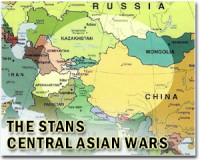| . |  |
. |
Washington (AFP) Oct 23, 2010 When it crafted a giant civilian aid plan for Pakistan last year, the United States proclaimed a turning point in a troubled relationship, with US money henceforth to serve the cause of democracy. On Friday, in the wake of the latest tensions between the war partners, President Barack Obama's administration announced it would seek another two billion dollars in aid for Pakistan -- this time, destined for the military. The Obama administration has repeatedly pledged support for civilian rule in Pakistan, which was restored in 2008, and said Friday it would bar assistance from several military units accused of human rights abuses. But the latest aid package shows that the United States is also keen to meet the wish-lists of the army, which has long been a major player in Pakistan and provides vital logistical support for forces in Afghanistan. Teresita Schaffer, a former US diplomat who has served in Islamabad, said the United States faced a balancing act between working with the military and supporting civilian institutions. "The US routinely has trouble figuring out exactly where that line belongs and how to stay on the right side of things," said Schaffer, director of the South Asia program at the Center for Strategic and International Studies. "Partly that's because the military in Pakistan is a can-do institution, much more so than the civilians," she said. "This is partly theatrics, but we as a people are magnetically drawn to an institution and a leader who says, 'Yeah, I can help you with what you really want to get done,'" she said. Secretary of State Hillary Clinton announced the military package during the two nations' latest Strategic Dialogue, where Pakistan's public face was Foreign Minister Shah Mehmood Qureshi. But as in previous talks, Pakistan's army chief, General Ashfaq Kayani, also turned up in Washington and held meetings behind closed doors. Kayani was unusually public last year in his criticism of Washington's five-year, 7.5 billion-dollar civilian aid package, calling it undue foreign interference. The bill's authors -- Senators John Kerry and Richard Lugar and Representative Howard Berman -- described the aid as a way to improve US relations with ordinary Pakistanis and dent the allure of Islamic extremists in the nuclear power. More recently, Kayani was said to have criticized civilian leaders over their response to major floods. President Asif Ali Zardari stayed in Europe when the disaster struck, saying he was more needed on the diplomatic stage than at home. Shuja Nawaz, director of the South Asia Center at the Atlantic Council, said he did not see a shift so much in Washington's relations with the Pakistani military as with its perceptions of the civilians. "I think the civilian government has missed a number of opportunities to show it is in charge and can take decisions rapidly and firmly, and the floods were a very good example of that," Nawaz said. The US Congress needs to approve the two billion-dollar military package, which would be spread over five years. While the Kerry-Lugar-Berman Act won wide backing last year, some US lawmakers have since voiced impatience at what they perceive as ingratitude from Pakistan. Other lawmakers have accused Pakistan of being too cozy with Afghanistan's Taliban, some of whom roam freely in lawless border areas, and faulted Islamabad's strategic focus on rival India. Still, some analysts predicted that Congress would ultimately approve the military aid, which replaces an earlier five-year package that expired. Lisa Curtis, a senior research fellow at the Heritage Foundation and former US policymaker on South Asia, said that a more critical test for military assistance to Pakistan may come next year. Under the Kerry-Lugar-Berman Act, the administration must certify in 2011 that Pakistan is taking action against Islamic extremists on its soil for aid to continue, although the president has the power to waive any cut-off. "We are entering a somewhat new phase in US military assistance to Pakistan when for the first time we're actually seeing the aid conditioned on Pakistan meeting benchmarks," Curtis said.
Share This Article With Planet Earth
Related Links News From Across The Stans
 US offers Pakistan two-billion-dollar military package
US offers Pakistan two-billion-dollar military packageWashington (AFP) Oct 22, 2010 The United States has made a new bid to improve its uneasy war partnership with Pakistan by offering a two-billion-dollar arms package but warned it will not tolerate human rights abuses. The five-year assistance plan satisfies a key request of Pakistan's influential military, which assists the US military in Afghanistan and was initially uneasy about a US shift to civilian assistance. S ... read more |
|
| The content herein, unless otherwise known to be public domain, are Copyright 1995-2010 - SpaceDaily. AFP and UPI Wire Stories are copyright Agence France-Presse and United Press International. ESA Portal Reports are copyright European Space Agency. All NASA sourced material is public domain. Additional copyrights may apply in whole or part to other bona fide parties. Advertising does not imply endorsement,agreement or approval of any opinions, statements or information provided by SpaceDaily on any Web page published or hosted by SpaceDaily. Privacy Statement |